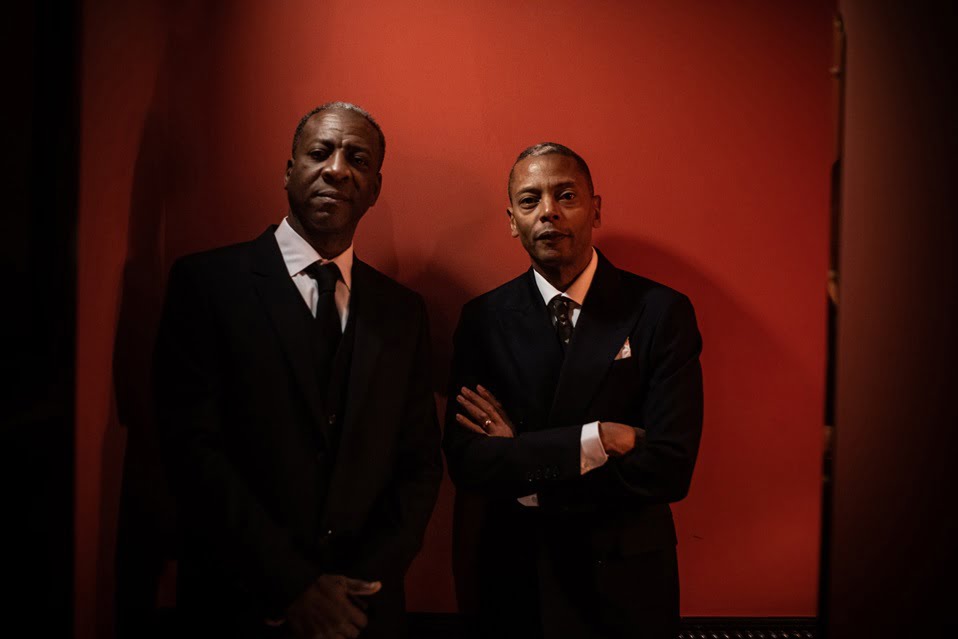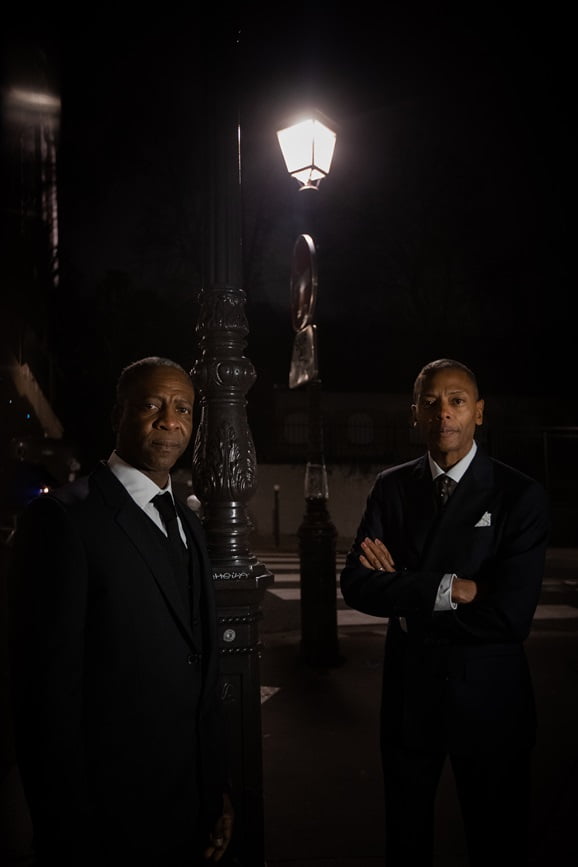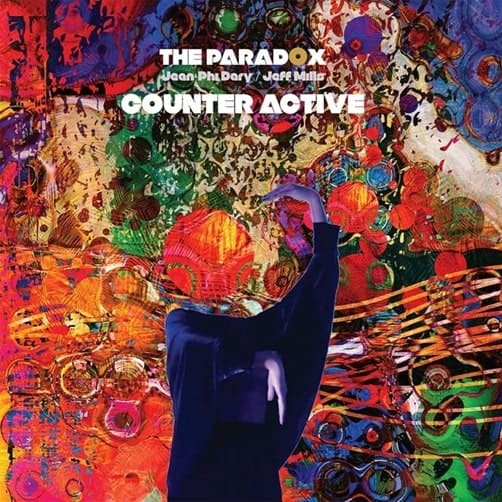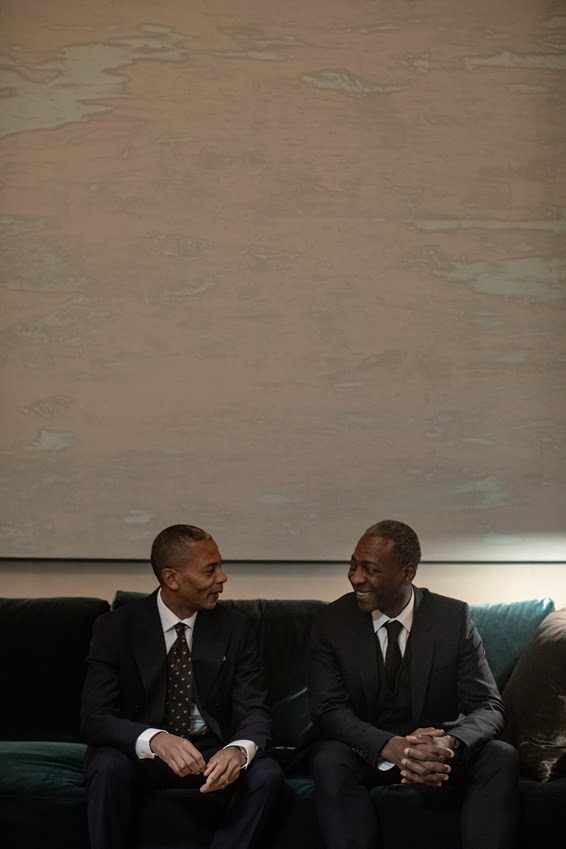We spoke to Jeff Mills and Jean-Phi Dary about their new electronic jazz project: The Paradox. Click here for the Spanish version.
Jeff Mills, the renowned The Wizard around the world and who became an influential figure of Underground Resistance and techno music from Detroit, taking shape as a multifaceted artist shaped by his passion for space and science fiction being reflected from his legendary label Axis, has teamed up with Jean-Phi Dary, an enriched musical soul of Guyanese descent who from France has infused into his being all the taste of his father’s influence for Afro-Cuban and kompa music, in which he merged with his A taste for jazz, reggae and funk, considering himself a multi-instrument musician with an undeniable taste for the keyboard and piano that began to echo in clubs during the 1980s in southern France before moving to Paris. Proving to be the catalyst for his musical journey, Jean-Phi has played and collaborated with the likes of Papa Wemba, Peter Gabriel, and Tony Allen, building a career that spans decades and has taken him everywhere playing Afrobeat, jazz, soul, and a plethora of others contributing at the same time to more than twenty albums.
Now, and thanks to their union with the late Tony Allen, both artists took advantage of the experience of working on the same project to open up a more external work called The Paradox, where electronic music and jazz and funk are the base of an album that is designed to show an example of two minds coming together without compromise or without creative conditions, letting the music, as they say, “represents who we are and exactly what we want to say.”
We take the occasion of their debut album to talk a bit with both artists.

Your union came about through a collaborative project with the late Tony Allen. Could you tell us about when you started writing/producing music, what were your first passions and influences beyond having a relationship of interest linked to sound?
Jeff Mills: Keyboardist Jean-Phi Dary was the third member of the Tony Allen collaboration. For every performance, we would need to have a sound and line check for all the instruments we were to play. Tony would sometimes arrive a bit later to this. In testing the instruments, Jean Phi and I would create music or play an idea so that the sound engineers could have an idea of the volume levels and EQ. It was in this time, that we noticed how too easy it was to play together and create music on – the – fly. Jean-Phi is excellent in reading a real-time situation and modifying himself to answer what he’s hearing. He’s truly a master.
Jean-Phi Dary: We spend so many time having funs during the shows and the soundchecks with Tony that it was like an evidence for Jeff and I to experiment by ourself. The idea of working together was to going deep in production from improvisation.
What about the music and / or sound that drew you all together in this “external project”: The Paradox?
Jeff Mills: The basic idea of The Paradox is to be free – to do what we feel. In playing and listening so, creating without conditions is a large part of the concept. You can easily hear this on the album and in the tracks, but beneath it all is a shared vision of what music could if musicians stayed focused on creativity.
Jean-Phi Dary: Mixing Jazz, impro, techno, electro and just let go and see where we are going…
Humans are complex animals and we change over time, so to have one train of thought for an entire career is not realistic. […] Common ground needs to be established. Egos and too much emphasis on what “I like” has to be left out and a teamwork mentality comes into play. It helps to always be kind, respectful and thoughtful. – Jeff Mills
For most artists, originality is preceded first by a learning phase, and often by emulating others. How was this for you? I mean, you two have a sound that has been defining itself over the years. But how would you describe that transition / fusion development and see music not as an original project of one person but as a collaboration?
Jeff Mills: Yes, you are correct. For me, I started in this way of learning enough to be able to try and emulate the music and artists I liked. At some point, I began to venture off into various perspectives until I locked onto a way that I felt most comfortable with. Humans are complex animals and we change over time, so to have one train of thought for an entire career is not realistic. Over time, I taught myself to ping pong between different styles, different concepts and projects effortlessly. Above everything else, I love to create music, so this helps! In collaborating (of any creative work), I think it is important to know how to sense and listen for shared thoughts on particular subjects (related to music or other things) with the person you’re about to work with. Common ground needs to be established. Egos and too much emphasis on what “I like” has to be left out and a teamwork mentality comes into play. It helps to always be kind, respectful and thoughtful.
Jean-Phi Dary: Collaborate with people often push you where you would not have gone by yourself. To me being part of such a project where you can do whatever you want is just the best way to express your originality. And Tony and Jeff trust me on their project. When Jeff talks to me about the idea of the project. To me It was the continuation of the experience

Collaborations can take on many forms. What role do they play in your approach and what are your preferred ways of engaging with other creatives through, for example, file sharing, jamming or just talking about ideas?
Jeff Mills: Talking is vital. Even before music is created. Having the relaxed time to think about what was said is important too. I find that “jamming” together before the record button is pressed is the best way to know a person – to have some idea of where you both might be able to travel to.
Jean-Phi Dary: On this project the first step was to talk about things, not only music, then we jam. But not jamming for jamming, but create with all the freedom you want. All Directions were possible. Music is inside our life, so playing music or talking, sharing things is the same.
What were your main songwriting and production challenges in the beginning and how did it change over time?
Jeff Mills: I was lucky to not have many problems making music early in my career and I think that it helped (in the long run) to simply make music solely for myself. Not for the ears of an audience, but for me to listen to and examine what it does to the listening space. There are many tracks that I made only for this purpose – in fact, most of the music I make is for this reason. Only a small percentage is released to the public.
Jean-Phi Dary: To me the X FACTOR was the more challenging. I remember that we were talking about Theolonius Monk. The way he was thinking, and doing things in a different way than the others. And after the first takes, on a second studio session when we start recording, I was thinking how classical writing could sound on this track.
Looking at the album, which was the most challenging collaborative composition?
Jeff Mills: All were easy to create, but this Pandemic struck just when we were to begin the mix-down sessions, so we had to find other ways to manage this. Jean-Phi in Paris, myself in Miami and the studio and engineer Steve Kovacs) in Chicago, we found a audio sharing app that we could all listen and reply in real-time. And because Jean-Phi and I were in our separate studios, we could have similar listening dynamics as to the studio where Steve was working. We mixed the entire album in this way.
Jean-Phi Dary: Each track was a challenge itself. Each track has its own story tell so it was a story to write from free creation, jam to production.
When the listener can hear everything clearly, I can put more emphasis and give more character to that particular voice. Finding the right balance between sounds can be difficult and it takes a special mindset to know what “feels” good. At times, this aspect can conflict with logical thinking. – Jeff Mills
Which track became the elixir /inspired you most to continue composing in that way?
Jeff Mills: I would have to say “X-Factor” is the track that we found most unique and the best example of what The Paradox is about. We made this in one-take and it encompasses a mixture and a variety of different styles of playing. The track is about traveling into unknown territory.
Jean-Phi Dary: We have many tracks recorded. Some are not belonging to this first part album. And most of them were recorded at the beginning of the process.
Production tools, from instruments to complex software environments, contribute to the compositional process. How does this manifest itself in your work? Can you describe the co-authorship between yourself and your tools?
Jeff Mills: As an electronic musician, I would be rare in this context. I choose not to use computer software to write and compose because it reacts too fast to my commands. I prefer to have time to think about it. It takes longer but with this way, the overall track remains simple and rhythms that are heard are the ones that are necessary. Clarity in music is important. I prefer to use software for other tasks like editing and post enhancements, etc. I like to play the synthesizers and machines, not just program them. In working with Jean-Phi, it helps to be quick and to know the equipment well.
Jean-Phi Dary: Well Jeff took care of the analog drum machines and me, I took care of the analog keyboards. I use the computer to do some edits only.

There are many descriptions of the ideal state of mind for being creative. What is it like for you? What supports this ideal state of mind and what are distractions? Are there strategies to enter into this state more easily?
Jeff Mills: Most of the music I created has been made during the nighttime hours. At times, when most people are sleep. When there is more stillness and less confliction with other sounds. The sight and mood of the Moon is written into many of the tracks. Again, clarity is important because, this determines how much sound is actually needed for the track to make its point. When the listener can hear everything clearly, I can put more emphasis and give more character to that particular voice. Finding the right balance between sounds can be difficult and it takes a special mindset to know what “feels” good. At times, this aspect can conflict with logical thinking.
Jean-Phi Dary: Staying focused on what you have to do is the key. I use some breathing techniques coming from a method called Ethos flow. This helps me staying calm and focus as we do on stage.
Today Music is everywhere and everybody loves music and listens to music. Maybe because music is vibes, physically and psychologically. It‘s something that touches everybody. So to me, music heal and save people. – Jean-Phi
Speaking of the ‘ideal state of mind’, you mention that the project is like an “uncompromising freedom and the manifestation of new ideas allowed them to reach a higher level of spiritual awareness within their work”. How can spirituality help to see music differently and have a focus beyond being to listen, dance or appreciate?
Jeff Mills: Dreaming is the device that gives ideas flavor so, the more experience one has with dreaming, the more dimensions can be explored. I’m not a religious person, but I’m sensitive enough to rationalize all the beliefs people have and prescribe. Optimism is key. I think it’s important to have some idea or plan of what purpose the music or creation might have – even if it is an unreasonable one.
Jean-Phi Dary: Today Music is everywhere and everybody loves music and listens to music. Maybe because music is vibes, physically and psychologically. It‘s something that touches everybody. So to me, music heal and save people. We can see now with the pandemic situation how the lack of live concerts how people and artists really miss live events.
The cover design was done before the music was finished, and I understand that based on the image you two remembered the limited freedom you had to finish what you started. Although art can be a purpose in its own right, but it can also directly feed back into everyday life, take on a social and political role, and generate greater engagement. Can you describe your approach to art and how over time it has been fundamental in your career?
Jeff Mills: The language between Art and Music is the same. Making a career of creating something from nothing takes a unique insight and focus in a World where we’re generally taught to learn, use, consume and dispose. The creation of art work can be an artform in itself. “Art”, the stuff we see in museums and hanging on walls is the result and aftermath of vivid thinking. In my case, I’m not trained as an Artist, so instead, I have surrounded myself with all the things that I can afford I know stokes my imagination.
Jean-Phi Dary: As a musician, composer, writer art in his big entity feeds me and pushes me. I’m not a specialist but I can feel and imagine the different steps of creation.
How do you see the relationship between the ‘sound’ aspects of music and the ‘composition’ aspects? How do you work with sound and timbre to meet certain production ideas and in which way can certain sounds already take on compositional qualities?
Jeff Mills: The acoustics in which sounds generate, depending on the space and circumstances, are key. For example, what sounds good in a dance club might sound horrible in headphone or on a hi fi system. Each situation deserves different applications. To learn this takes many years of listening to music, being around and studying people, understanding what it means to “create” music and the usage of Time itself. For example, what sounds terrible on Monday at 12 noon might sound amazing on Saturday at 3AM. Meaning, music is only one part of the process. People and their moods (and tolerance levels) are another.
Jean-Phi Dary: Some sounds, especially analog sounds, are talking to you directly and allow you to have ideas. It’s like this sound gives your ideas. It makes you play the instrument like you wouldn’t even though before.

Our sense of hearing shares intriguing connections to other senses. From your experience, what are some of the most inspiring overlaps between different senses – and what do they tell us about the way our senses work? What happens to sound at its outermost borders?
Jeff Mills: Sure, I can only truly speak in my case as it would be different with others. The limits of my imagination steers what my music will sound like, not necessarily it feels like to the listener. This is something I’ll never know. So, I have to always work and make music with this missing value and only imagine what the listener is feeling. I know that so many important points are lost in the translation (between what I mean and what the listener understands) that it doesn’t even make sense to work towards this objective. Instead, what fosters is a way of creating modularly. I’m hoping the music will fall within a certain vicinity by making music multi-approachable. Universal understanding is really what makes dance music work. But then, not necessarily for Techno Music. This genre requires a whole different type of thinking and approach. I can go into the long-stemmed mechanics of it, but to encapsulate, there is no correct or right way to make music. It is not an exact science so exact estimations and calculations are rare to find examples of. If one can live with this, it might be possible to have a career in Music.
Jean-Phi Dary: Stevie Wonder organized a listening of his new album at that time, in a bus pluges into the dark, for the journalists. I think it was for the album “Songs in the key of life”. I think, I’m not sure. He wanted the journalist to have the same experience that he uses to have as a blind person. Amadou and Maryam the Malian’s artists are doing a lot of concerts in that way. I’m sure it‘s a completely different listening experience.
Our brain is a marvelous tool that makes connections between what we feel, hear, touch, eat and what we imagine from these information’s. The two brain hemispheres work together without doing the same things but when you play an instrument both sides seem to work in a better way. I’m sure that listening music works the same.
Interview by Mauricio Atencia.





